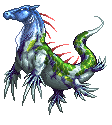Viewing Green Searunner

Father: Unknown
Unknown Pedigree
Hardiness: 49
Appearance: 13
Emerged: 21:20 19.06.2023
Matured: 12:16 21.06.2023
A prevalent and diverse species of fish, Limaka Cevalos are found throughout the tropical and temperate oceans. Though their main source of food is phytoplankton or seaweed, these opportunistic grazers will consume any vegetation they can find, making them an ecological hazard if their population grows unchecked. During mating season, males will court females with offerings of food, grooming, and spending time with them. Pairs mate for life, and malescarry the eggs in a pouch on their ventral side until the juveniles emerge. Both parents care for the young until they are old enough to survive on their own.
Named for their roaming nature, Searunners travel in tight-knit, extended family groups. Each herd has a matriarch that guides them between kelp forests, their preferred grazing grounds. As they travel, they eat what they can find and will share food sources with other herds. When intermingling with other families, courting may occur among unmated Searunners, and males will then join their mate’s herd. Every herd has an ancestral spawning ground that they return to once each year. While Searunners are fairly amiable, they tend to avoid other creatures and prefer to flee rather than fight.
The creatures that dwell in this rather desolate world still display some diversity in appearance, eating habits, and social behavior. Whether they have fur or feathers, skin or scales, their unique genetic makeup allows for a variety of colors and markings within each species. Despite limitations in food sources, herbivores, omnivores, and carnivores are all present in the food chain, and each species requires specialized care within a laboratory. Although the artificial setting of housing units and breeding pods precludes most opportunities to study true interspecific behavior, the interactions within and between species has been studied extensively in the wilderness by scientists daring enough to venture beyond the outpost’s walls.
